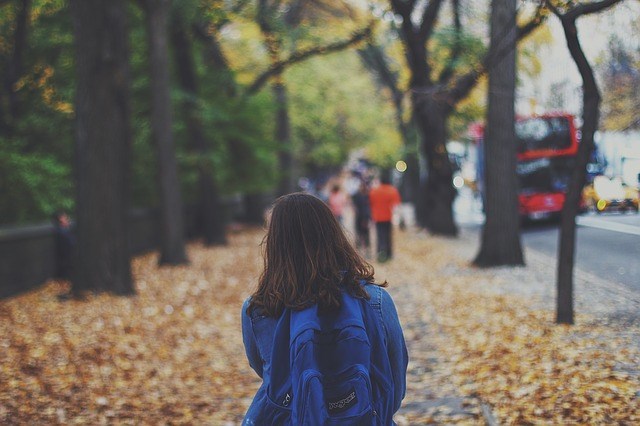Parental fears about the dangers of children walking alone to school are overblown, says an injury prevention researcher.
In fact, kids benefit from being independent and walking to school can help them become self-confident, resilient and better able to manage risk responsibly and safely, says Mariana Brussoni, an assistant professor at UBC and researcher with BC Children’s Hospital.
Research has found that children who play in physically demanding activities such as climbing and jumping, rough-and-tumble play, and exploring alone displayed greater physical and social health then their more sedentary and protected peers.
Among the positive benefits, researchers found included physical health, greater awareness about the environment, risk-management skills, self=confidence, resilience and improved executive function (whereby the brain decides on a goal and what is needed to achieve it).
“It used to be quite common for kids to walk to school, now it’s much less common,” said Brussoni, who will be speaking on a panel next Tuesday at Douglas College's David Lam Campus in Coquitlam on adventure play for children.
Why is it so rare for parents to let their kids walk to school alone?
“Parents see their children as more vulnerable then they really are,” Brussoni told The Tri-City News. “We have a tendency to protect them more than they need to be protected.
"Parents are understandably overwhelmed with fear. They’re worried about their child getting hit by a car, getting kidnapped, serious injury or getting bullied, or other parents calling social services on them because they let their kids walk to school.”
The reality is that more children die from car accidents and suicide than from independent play activities or even walking to school.
“So kids aren’t dying from being outside playing," she said. "Our perception that these are high-risk activities isn’t actually accurate.”
Perhaps if parents could manage their own fears and expectations, they might be surprised to see their child successfully navigate their way to school.
To that end, Brussoni worked with UBC researchers and several health organizations to launch a free online tool — located at outsideplay.ca — that helps parents reflect on their own experience and develop goals for themselves for allowing their children to take part in risky play.
She also recommends parents whose children would like to walk alone to school practise pedestrian safety and even make a few trial runs — with the parent a block or so behind the first few times, if necessary — so everyone is comfortable with this independent step.
Brussoni also said some neighbourhoods may be more challenging for independent walking because there are a lot of busy streets, and some children may be more mature and prepared emotionally for the challenge.
Still, she said, it’s an option to consider in the first busy week of back-to-school when the weather is still nice.
• Tickets for the evening discussion of nature and adventure play, including two films and a panel discussion, taking place Tuesday, Sept. 5 from 6 to 9:30 p.m. at Douglas College in Coquitlam are available at eventbrite.ca (search "Adventure Playgrounds and Nature Play").



